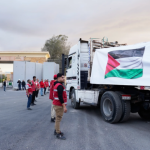
Prisoners released from notorious Syrian prison forget their names
Hundreds of people have flocked to Saydnaya prison, which has become a symbol of Syrian dictator Bashar al-Assad’s repressive policies since his fall. The notorious military prison has held thousands of people for decades for opposing the Assad government.
In a report on Monday (December 9), the BBC reported that Dr. Sharvan Ibesh, chief executive of the Turkish-based aid organization Bahar, had rushed to the prison to look for his imprisoned relatives. He arrived there in the middle of the night to look for a friend’s father. His friend believes that his father has been held in Saydnaya prison for the past 13 years.
Dr. Sharvan said, “We couldn’t find him there. It’s very disappointing. We haven’t even received any information about him.”
When Sharvan arrived at the prison, there was a very chaotic situation. Hundreds of people were leaving the prison.
He said, “My friend became very depressed. Because for 13 years he has dreamed of getting his father back one day. We were told that many prisoners have been moved elsewhere.’
Yesterday, Sharvan also visited the Al-Salam Mosque in Damascus, 20 kilometers from the prison. Many prisoners from the Saidnaya prison were brought there so that their families could find them. Many family members went there to look for their imprisoned relatives.
Sharvan said that he spoke to two people at the mosque who had been imprisoned in that prison for many years. Everything was unfamiliar to the two of them.
He said that they did not even know the time of day. Many people around them asked them their names and ages; but they could not even answer that. It was very difficult to guess their ages by looking at them. Sharvan said that these people were completely helpless. They were just looking around.
Bashar al-Assad’s government has fallen in the face of the rebel offensive. Saidnaya prison is one of the prisons that the rebels have since taken control of. The prison is notorious for its abuse of prisoners.
Authorities in Damascus province said the process of freeing prisoners from the secret cells was ongoing. They were nearly suffocating to death due to lack of adequate ventilation.
Video footage from yesterday showed prisoners breaking out of the prison. Media reports said many were trapped or hiding in underground cells, but human rights groups said they had not received any confirmation of such reports.
The White Helmets, a non-governmental organization renowned for its emergency rescue work in Syria, said its team had not found any secret doors. They were accompanied by people who knew the prison’s entrances and secret passages. They searched every corner until they were sure.
The Association of Detainees and Missing Persons of Saidnaya (ADMSP) was formed in 2017 by families of survivors of Saidnaya prison, victims of torture in the prison, and many others who are imprisoned there. In a 2022 report by the organization, it was reported that Saidnaya prison turned into a “death camp” after the start of the civil war. According to them, more than 30,000 prisoners were killed or died of torture, lack of medical care, or starvation between 2011 and 2018. And at least 500 prisoners were hanged between 2018 and 2021.
Now the organization has said in a statement that there are no prisoners being held in the prison. They say that there is no truth to the idea that prisoners are being held in secret underground cells. The media reports that have been reported about the entrapment are not accurate. They also claim that the last prisoner has been rescued from the prison.
As rebels entered Damascus on Sunday, Hayat Tahrir al-Sham (HTS) declared that the “era of torture in Sayedana prison has ended.”
In 2017, Amnesty International described the prison as a “human slaughterhouse.” Their report alleged that the executions were carried out at the highest levels of the Assad government. However, the then government rejected Amnesty’s claim, calling it “baseless” and “truthless.” They claimed that the executions were carried out in accordance with due process.
Syrian rebel fighters toppled the Bashar al-Assad government on Sunday after just 12 days of fighting. The rebels then took control of government prisons and began releasing prisoners.
Government forces have held thousands of people in detention camps since 2011 during the civil war. Human rights groups allege that torture of detainees in these camps was a daily occurrence.






![Pakistan accuses the TTP of carrying out attacks on its territory and the Afghan Taliban government of harbouring the group [File: Fayaz Aziz/Reuters]](https://asiandiplomacy.com/wp-content/uploads/2025/10/2023-02-27T041341Z_1777986366_RC2O7Z9GI1FB_RTRMADP_3_PAKISTAN-BLAST-POLICE-1760256429-150x150.webp)